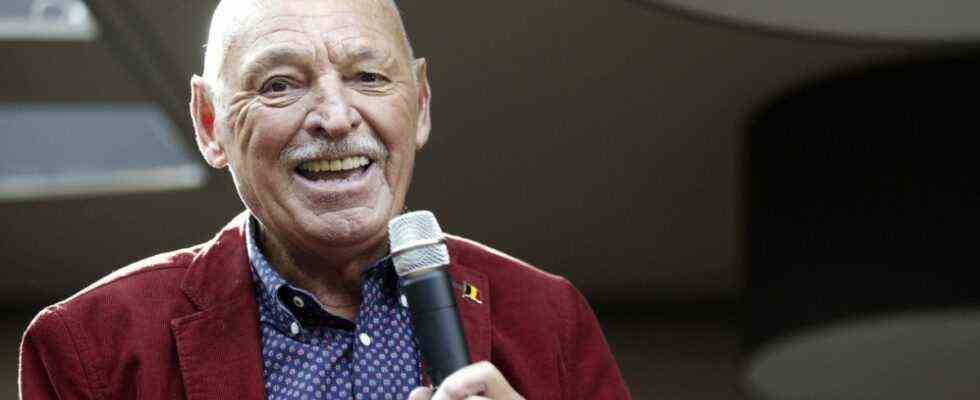When a person is overwhelmed by happiness and perhaps also by alcohol, and when they want to share this moment with others, clever words rarely occur to them. Then he doesn’t really know what to do with his great feelings, then he just screams and yells and sometimes he just screams. Or he sings a couple of Olés out into the world. Ole Ole ole Ole. Millions of happy people around the world do this without knowing why. You caught the Olé somewhere like a very persistent virus.
It was sung when the Berlin Wall fell. It can be heard in endless loops in football stadiums, usually with the addition “We are the Champions”. At rock concerts, the audience likes to fill the breaks with it, again and again with Bruce Springsteen, very massively with the Rolling Stones. When the Stones toured Latin America in 2016, a wave of ole swept over them. They consequently titled the documentary about the tour: “Olé, Olé, Olé. A Trip Across Latin America”.
When the Belgian musician and singer Jean Jules Vanobbergen was shown the film, he couldn’t believe what he was seeing and hearing. It was “just surreal”, he said in interviews: the Rolling Stones and you – his! – Olé!
Last Wednesday, Jean Jules Vanobbergen, whom everyone in Belgium just called Le Grand Jojo, died at the age of 85. The television changed its program, the newspapers cleared double pages for the obituaries. Le Grand Jojo has become a folk hero with his ingenious painless and senseless songs. Of course, that also has to do with his most successful song. He wrote it for the football professionals of the Brussels club RSC Anderlecht and sang it with them: “Allez, allez, allez, allez, we are the champions”. Before the 1986 World Cup in Mexico, he reissued it for the Belgian national team. The Allez became Olé. And this Olé went out into the world and comes back to this day as an echo from all corners of the world, in millions of variants.
One might think that people from southern Europe or Latin America don’t need tutoring from Belgium to get an ole over their lips. But it actually seems to be the case that the fans of SSC Napoli took the work of the Grand Jojo as the basis for their legendary hymn to the football god Diego Armando Maradona. Oie Oie Oie Oie, Diego, Diego. The singing returned to Argentina with Maradona, spread throughout Latin America and spilled over into the concerts of the Rolling Stones. There are no other conclusive explanations. And even if Le Grand Jojo had copied an Oléolé somewhere: so what? All his life he has appropriated freely floating texts, melodies and even feelings and given them back to the world in his very own form. That was his art.
He slipped into a Roman toga when he sang his song to the gay Julius Caesar
Kreuzberg nights are long, the Blattuß brothers sang in Germany: “Chef un p’tit verre, on a soif”, that’s what Le Grand Jojo made of it. Another small glass, boss, we’re thirsty. He disguised himself as a foreign legionnaire. He slipped into a Roman toga when he sang his song to the gay Julius Caesar, who doesn’t put on pants so the world can admire his legs. In Germany the song by Gottlieb Wendehals is known as Polonaise Blankenese. In his “Tango du Congo” Madame Caca rhymed with snack bar and catanga. Le Grand Jojo was denounced as a racist because of the song, but in later years he was embarrassed himself. But I just couldn’t help it, he said. It had to go. It was just great fun.
Le Grand Jojo thus became the embodiment of “Belgitude”, a Belgian way of life that is a contradiction in terms. Because the Flemings, the Walloons, the Brussels, the German speakers are mostly so at odds with each other that one cannot really speak of a national feeling. At the yo-yo level, however, you could always communicate: Another glass, boss, we’re thirsty. This Belgitude also includes the ability to mess with oneself. Le Grand Jojo had this talent in abundance, along with many others. At a young age he drew comics, played the drums, emulated Jacques Brel from Brussels for a short time as a singer and immersed himself in jazz. To earn money, he stocked jukeboxes with jazz records. A landlord said to him: What he wanted with this jazz, nobody could sing along. The man can be helped, thought Jean Jules Vanobbergen. And soon his own songs were booming from the jukeboxes.
Le Grand Jojo not only had to bury his wife, but also his daughter at an early age, but never made a fuss about it. He just kept singing and even survived a helicopter crash unscathed. Only the Covid loneliness robbed him of the courage to live. His Olé, however, will live forever.

